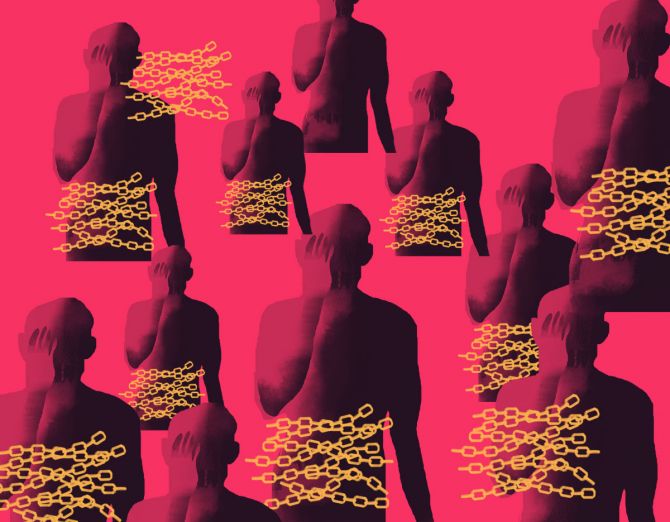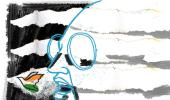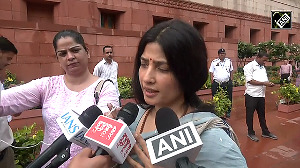'Nearly 13,000 individuals have been charged for sedition since 2010.'
'If the Supreme Court stay ever gets vacated, arrests will follow immediately.'

Last month, the Union government told the Supreme Court it had initiated the process of re-examining Section 124A of the Indian Penal Code, which criminalises the offence of sedition.
Attorney General R Venkataramani, appearing for the Centre, said consultations on a review of Section 124A 'were (in advanced) stages'.
He urged the Bench to post the matter for hearing after the monsoon session of Parliament, scheduled for the end of July or August.
A Bench of Chief Justice of India Dr Dhananjay Yeshwant Chandrachud and Justice Jamshed Burjor Pardiwala took note of the attorney general's submissions and posted the matter for hearing in August.
This follows an earlier order by the Supreme Court that the law on sedition be kept in abeyance till the government's exercise of reviewing it is complete.
It had asked the central government and the states not to register any cases under Section 124A.
It had added if such cases be registered in future, the parties would be free to approach the court and the court would have to expeditiously dispose of these.
The court's order was hailed by many human rights and civil rights activists.
However, lawyers say the use -- and misuse -- of the sedition law continues to hang like a sword over the Fundamental Right of Free Speech and other rights.
Despite the order, "FIRs have been filed, but no further action taken. I understand investigations have been completed and chargesheets prepared, but there is no arrest. So, it is like an imminent threat. If the Supreme Court stay ever gets vacated, arrests will follow immediately. The law is very much there ..." says Sanjay Hegde, a senior advocate at the Supreme Court and a civil rights lawyer.
The government's view on 124A is hardly a secret.
When in the run-up to the 2019 general elections, the Congress included scrapping Section 124A in its agenda, the Bharatiya Janata Party criticised it in the strongest possible terms.
Speaking at an election rally in Gujarat in April 2019, Prime Minister Narendra Modi said: 'Are people who want to break the country into tukde-tukde not anti-nationals? ... The Congress is now saying that they will repeal the sedition law. Should we expect this from a 125-year-old party?'
Haryana Chief Minister Manohar Lal Khattar told a rally in Yamunanagar: 'The Congress wants to abolish the sedition law and amend the Armed Forces Special Powers Act. Such a step will hit the integrity of the nation. We will bring a stronger law against those who want to break the country.'
The background
In October last year, Union Home Minister Amit A Shah called a meeting of the home ministers of all states at Haryana's Surajkund.
Dubbed 'Chintan Shivir', Shah's aim was to convey the central government's thinking on approaches to law and order, including the legal framework that governs this: The Code of Criminal Procedure (CrPC) and the Indian Penal Code (IPC).
In his inaugural address, Shah said: 'This Chintan Shivir will help in planning a joint plan to deal with cybercrime, narcotics, cross-border terrorism, sedition and other such crimes...'
'Various suggestions have been received regarding improvement in the CrPC and IPC. I am looking into them, and have invested hours in them. We will very soon come up with new CrPC, IPC drafts in Parliament.'
Shah was referring to a government-constituted committee in 2020 to review the CrPC and the IPC, headed by G S Bajpai, the vice-chancellor, National Law University, Delhi, with lawyer Mahesh Jethmalani and other members.
The mandate was to recommend ways in which India's criminal justice system could be updated in keeping with the requirements of modern India.
The committee has since given its recommendations, about which very little is known.
Pressure on the government to either scrap or decriminalise sedition is building up.
'The low rate of conviction in cases pertaining to Section 124A casts serious doubt on the genuineness of the claims made during investigation and prosecution, and shows that the real purpose of such laws is to provide autocratic rulers a powerful weapon to suppress their rivals and control public opinion,' the Constitutional Conduct Group said in a statement signed by 108 former civil servants of the all-India and central services who have worked with the central and state governments, soon after the Supreme Court order.
The signatories included former Cabinet secretary K M Chandrasekhar, former R&AW chief A S Dulat, former textiles secretary Wajahat Habibullah (also the first chief information commissioner), former home secretary G K Pillai, former Sikkim director general of police Avinash Mohananey and former additional secretary, Cabinet secretariat Rana Banerji.
'Change the expression 'sedition' because this gives the impression we live in a monarchy'
Sedition law should be applied only in cases where there is a high likelihood of inciting hatred and violence, G S Bajpai, vice-chancellor, National Law University, Delhi, tells Aditi Phadnis.
Union Home Minister Amit Shah had constituted a committee to rewrite the IPC, CrPC, and other laws to make them suitable for modern India. You were part of the committee. What were your recommendations?
The report is under consideration at a government level and no comments are warranted.
The Supreme Court has told the government to refrain from registering FIRs until the law on sedition (124A) is revised. The government has said it is in an advanced stage of revising it. What are the most problematic issues and will sedition be de-criminalised?
Nearly 13,000 individuals have been charged under Section 124A since 2010.
The law essentially functions as a measure to prevent and regulate certain activities.
The data of the National Crime Records Bureau shows that the conviction rate is too low.
The need is twofold: First change the very expression 'sedition' because this gives the impression we live in a monarchy; secondly, the Supreme Court judgment in the Kedarnath case needs to be factored in and the guidelines formulated can serve as major protection against the misuse of this law.
The blanket use of this law in all kinds of activities seemingly against the State needs to be graded for proportionate punishment.
Multiple Supreme Court rulings have stated a speech would amount to sedition only if it involves incitement to violence or public disorder.
Yet many have been charged with sedition, which is defined as any act or attempt 'to bring into hatred or contempt, or excite disaffection towards the government'.
How can modern India square the circle?
The laws having a bearing on the fundamental freedoms in a Constitutional democracy must be invoked with great care.
The State in a liberal democracy ought to be more tolerant of dissent and criticism of the state (than it is now).
As a last resort, sedition law should be applied only in cases where there is a high likelihood of inciting hatred and violence.
Feature Presentation: Rajesh Alva/Rediff.com












